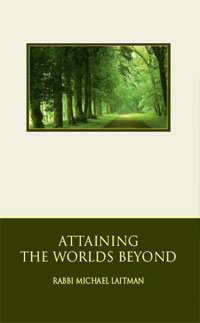The Fight Against Egoism
Since egoism—our desire to receive—is our essence, it predominates on all levels of nature, from the atomic-molecular to the hormonal, animal, and higher levels.
Egoism extends all the way up to the highest systems of human reasoning and the subconscious, including our altruistic desires. It is so powerful that we are incapable of deliberately opposing it in any situation.
Therefore, if we want to escape the power of the ego, we must fight it. We must act contrary to the desires of our bodies and our reason in everything relating to our advance toward the spiritual, even if we cannot see any benefit to ourselves.
Otherwise, we will never transcend the limits of our world. In Kabbalah, this principle of work is known as, “Force him until he says ‘I want.’”
From Egoism to Altruism
The transformation of our egoistic essence into an altruistic essence happens as follows: In His wisdom, the Creator generated a desire for self-gratification and implanted it in human beings. This desire represents egoism, a black point in one’s essence. It is black as a result of the contraction of Light (Tzimtzum), which took place when the Light of the Creator departed from it.
The correction of the egoistic essence takes place with the aid of a screen (Masach), which transforms egoism into altruism. We are incapable of understanding how such a miraculous transformation can take place until we experience it ourselves. It seems incredible to us that the general law of nature would change so that we were suddenly able to act where previously we could not.
In return for the immense pleasure that we receive from the Creator, we are incapable of giving anything back to Him except the thought that, although we continue to perform the same acts as before, now we are performing them because doing so pleases the Creator, rather than us.
But even this thought is not for the Creator, but for us. This allows us to receive unbounded pleasures without being ashamed of getting something for nothing. We may become more like the Creator by becoming altruists. When we do so, we are able to receive infinitely and experience pleasure, since altruism is not for the self.
Spiritual Life or Spiritual Death
Although we can force ourselves to commit a specific physical act, we cannot change our desires at will, because we cannot do anything that is not for the self. Kabbalists say that a prayer without the right motivation is like a body without a soul, for actions pertain to the body and thoughts to the soul.
If we have not yet corrected our thoughts (soul), for the sake of which we perform an action (body), then the action itself can be said to be spiritually dead. Everything is comprised of both the general and the particular. The general, the spiritually dead (domem), demonstrates that for most people, there can only be a general movement, but not a particular spiritual movement, for they have no inner need for it.
Spiritual Development Requires Movement
Being spiritually organic (Tzomeach) means that individuals possess a unique degree of inner movement and development. At this point, a person becomes known as Man, or Adam, as written in the Bible: “Adam—a tree in a field.” Since spiritual growth requires moving forward, and movement can only be caused when one senses a shortage of something, Man is constantly aware of those shortcomings that compel him to seek ways of growing.
If Man stops at any level of spiritual development, then he is pushed down in his perceptions. This is intended to urge him to move, rather than to stand still.
If, subsequently, he rises again, it is to a higher level than before.
As a result, one either ascends or descends, but one cannot stand still, for this state is not characteristic of Man. Only those belonging to the masses stand still and cannot fall off their levels; thus, they never experience falling down.
Spirituality’s Levels Correspond to Degrees of Altruism
Let us mentally divide space with a horizontal line. Above the line is the spiritual world. Below the line is the egoistic world. Those who prefer to act contrary to their reason can exist above the line.
These individuals reject earthly reason, even if it gives them an opportunity to know and to see everything. They prefer to proceed with their eyes closed, by means of faith, and to pursue the spiritual (altruism instead of egoism).
Every spiritual level is defined by the measure of altruism present within it. We occupy the spiritual level that corresponds to our spiritual qualities. Those of us who are above the line are able to perceive the Creator. The higher above the line we are, the stronger the ability to perceive.
Higher or lower positioning is determined by the screen within each of us. This screen reflects the direct egoistic pleasure that can be derived from the Light of the Creator. The Light above the line is called “Torah.” The screen, or the line separating our world from the spiritual one, is called a “barrier” (Machsom).
Those who pass this barrier never again descend spiritually to the level of our world. Below the line is the realm of egoism, while above the line is the realm of altruism.
 “What it Takes to Advance Spiritually” is based on the book, Attaining the Worlds Beyond by Dr. Michael Laitman.
“What it Takes to Advance Spiritually” is based on the book, Attaining the Worlds Beyond by Dr. Michael Laitman.


“…Since egoism—our desire to receive—is our essence, it predominates on all levels of nature, from the atomic-molecular to the hormonal, animal, and higher levels.”…
Question: Does it mean that the psycical changes on atomic-molecular, etc. level occure durring the process described in this article? (changing the nature from egoism to altruism)
Thank you. These articles are very valuable.